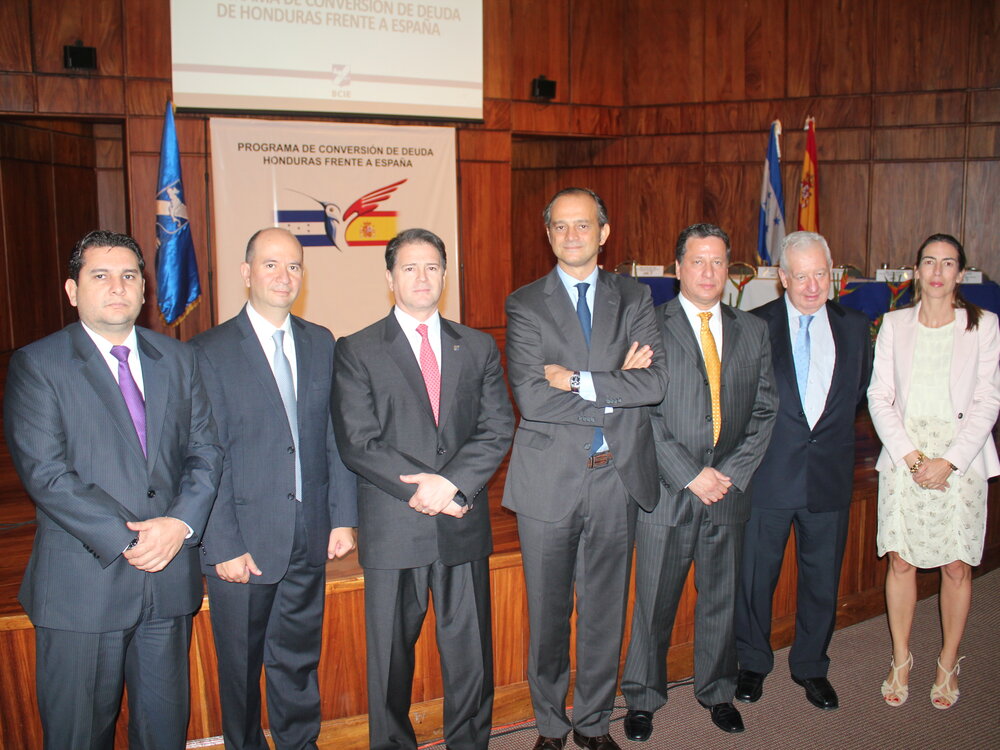US$55.3 Million investment finances projects that contribute to Honduran economic growth and social development

The Spanish Debt Conversion Program to Honduras will execute 24 projects in 13 departments, thereby contributing to the sustainable development of the inhabitants of 39 municipalities in Honduras.
Tegucigalpa, May 14, 2015. - Today Spain’s Debt Conversion Program to Honduras presented the results and impacts of projects executed under the framework of the initiative.
On September 24, 2005 Spain and Honduras signed the Spanish Debt Conversion Program to Honduras. The program aims to contribute to economic growth and social development in Honduras by condoning its US$138.2 million debt to promote investment projects that foster the country’s development and lead to poverty reduction. The program has US55.3 million in funds that are managed by the Central American Bank for Economic Integration (CABEI).
The execution of the 24 projects will benefit public sector institutions, NGOs, municipalities, community associations and public and private institutions in 13 of the 18 Honduran departments, having a direct positive impact in 39 municipalities.
With regard to the education sector, 12 projects amounting to US34.9 million have been financed and coordinated with the Ministry of Education; integral support is being provided from the pre-school level to higher education through the:
Construction and improvement of school infrastructure at 14 educational centers, including classrooms for preschool through ninth grade, laboratories, technical workshops and sports and administration facilities.
Construction and equipment of 19 vocational training and higher education workshops, with subjects including metal structures, handicrafts, electricity, electronics, AutoCAD, coffee production and processing, IT and biomass energy production.
Implementation of a distance learning platform at Universidad Pedagógica Nacional Francisco Morazán.
Supply of teaching material and curriculums to 4 production centers and to 3 centers to attend the technological and information needs of local governments, the private sector and the general public.
Annually, the program directly benefits approximately 26,000 persons, including students, teachers and parents. In addition, the coverage of projects including distance learning and preparation of teaching materials indirectly benefits the entire country's public and private education systems.
With regard to the environment sector, in the framework of an environmentally sustainable development process and in coordination with the Ministry of Natural Resources and Environment (SERNA) and the Forest Conservation Institute (ICF), the program contributes to:
- Promoting best practices and developing environmentally and biodiversity- friendly production processes in 7 municipalities, including the implementation of management plans, water source protection, reforestation and creation of demonstration farms.
- Implementing a Program of Payment for Environmental Services with private and public owners in 2 municipalities.
- Improving management capacities and tourism infrastructure in 3 protected areas, creating employment opportunities and increasing income from ecotourism; these protected areas attend approximately 20 thousand tourists per year.
- Improving solid waste collection, transportation and disposal systems, including the construction and equipment of sanitary landfills in four cities.
- Increasing potable water supply capacity through the installation of water treatment plants with their respective pipelines and watershed protection in 2 cities.
The execution of these initiatives will directly benefit approximately 1.6 million inhabitants of the projects’ target areas.
With regard to the renewable energy sector, the program provided a US$3.9 million investment to Universidad Pedagógica Nacional Francisco Morazán (UPNFM) in order to:
- Promote the use of renewable energy by installing a 1.4 MW photovoltaic solar panel system to replace the current conventional power supply.
- Provide a Honduras-Spain scholarship fund with national coverage with savings to the electricity bill.
- Prepare a training plan and provide workshops on renewable energy and energy efficiency.
- The program has directly benefitted 1,300 people (students, teaching and administrative personnel), who have been trained in renewable energy system operation and sustainability. Indirectly, the program has benefitted approximately 12,000 people, including family members and UPNFM’s student population.
The program’s main results contribute to achieving the United Nations Millennium Development Goals in the priority intervention sectors established in the Honduran government’s development policy and are also in line with CABEI’s Social Development axis.
The event’s attendees included the Spanish Ambassador to Honduras, Mr. Miguel Albero; the Chief Attaché of the Economic and Commercial Office at the Spanish Embassy in Honduras, Ms. Ana Jimenez; the Director General of Public Credit at the Ministry of Finance, Mr. Rigoberto Romero; the Vice Minister of Education, Ms. Elia Del Cid; the Director of the Forest Conservation Institute, Mr. Misael Leon; the Executive Vice President of the Central American Bank for Economic Integration, Attorney Alejandro Rodriguez; and CABEI Sector and Countries Manager, Mr. Horacio Leiva.







